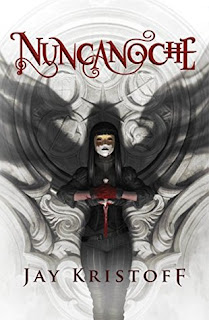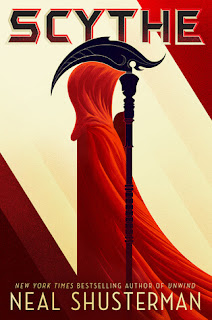Scythe | Neal Shusterman
Walker Books | #1 Arc of a Scythe | £7.99
Synopsis: A dark, gripping and witty thriller in which the only thing humanity has control over is death. In a world where disease, war and crime have been eliminated, the only way to die is to be randomly killed ("gleaned") by professional scythes. Citra and Rowan are teenagers who have been selected to be scythes' apprentices, and despite wanting nothing to do with the vocation, they must learn the art of killing and understand the necessity of what they do. Only one of them will be chosen as a scythe's apprentice and as Citra and Rowan come up against a terrifyingly corrupt Scythedom, it becomes clear that the winning apprentice's first task will be to glean the loser.
~Thank you Walker Books for the copy
Hi! How are you? Today I am going to review
Scythe, the first part of Neal Shusterman's latest saga, Arc of the Scythe. If you know me, you will already know that I love everything that he publishes and that
he is one of my favourite authors. I have read the Unwind saga (review
here), one of my favourites too, and
Challenger Deep (review
here); if you have enjoyed
Scythe, I truly recommend you to read his other books because he never disappoints.
The first thing I would like to emphasize is the setting. The world in which this story develops is full of small details that make it very rich, such as the scythes' robes, their rules, their traditions... and everything helps to create a symbology that is unique; it is fascinating, though it is not a surprise after having read the Unwind saga. Civilization is controlled by a god-like machine, the Thunderhead, and so corruption does not exist anymore. The whole world lives in harmony thanks to the equitable distribution of goods and food, and death is no longer a problem. Science has progressed so much that any wound, injury or disease can be healed; thus, humans are almost immortal. Almost, because Scythes cannot let this happen. To avoid overpopulation, it was decided that some people would be chosen to glean a certain number of individuals per year. They will become death professionals and they will have to master each deadly technique. Scythes choose when, where, and how a person dies, but in exchange they will have to give up their normal lives. For scythes are admired, but also feared and ignored, their presence is rarely welcomed and the consequences of their acts weigh heavy on their shoulders.
The characters, as always, are one of the strong points of the novel. Shusterman manages to create human characters, with virtues and flaws, that seem to run through the paper. Moreover, I love that his female characters completely leave aside the damsel in distress cliché. In this case, our protagonists are Citra and Rowan, two ordinary teenagers who will suddenly become Scythe Faraday's apprentices. Citra belongs to a wealthy family and has a small brother whom she loves with madness. She is honest and just, sometimes too direct and inquisitive, and very competitive. Rowan is not so lucky, since his belongs to a numerous, middle class family, and his mother does not pay any attention to him. He is brave and very empathetic. Both Rowan and Citra are good candidates for the scythedom, since they possess essential and required qualities for the job, and most importantly: none of them wants to be a scythe. Scythes must not enjoy their job, that is the first thing Scythe Faraday teaches them; in the end, they are murdering people randomly.
There is a lot of action in this book, especially when Citra and Rowan start their training sessions. There are violent and cruel scenes, others filled with pain and solitude, and others that show that hope and kindness are never completely lost. Shusterman will make you think, guaranteed, and I am sure you will question every single detail you read. What is right? What is wrong? What are the advantages and disadvantages of the world he has created? The characters will have to overcome a series of trials that will break their hearts and souls apart. Meanwhile, Citra and Rowan will get closer and closer. They must not fall in love with each other, they cannot. Nevertheless, as they are living this experience together they will be forced to rely on the other to survive. Their romance is not the main plot, but it is very natural and will leave you needing more.
Shusterman's style is impeccable. His writing is fresh, concise, and even though it may seem plain in reality his words carry powerful messages. In the case of Scythe, I have had the sensation that it was a bit less crafted, mainly because I did not find many shocking quotes. This is obviously subjective, and I must admit that Unwind is still my favourite Shusterman's saga so far. He also uses multiple narrators in this novel, which are Citra and Rowan, and thanks to this we are able to dive in the different layers that form this new world Shusterman has created. The ending is brilliant. I cannot say anything else. And I am going to finish this review by saying that I desperately need Thunderhead.
*********
RESEÑA EN ESPAÑOL
¡Hola, mininos! ¿Cómo estáis? Hoy vengo a hablaros de
Siega, la primera parte de la nueva saga que ha publicado Shusterman. Si me conocéis, ya sabéis que
amo a este hombre y que he leído casi todo lo que ha publicado hasta el momento. Aquí os dejo la reseña de
Desconexión y la de
El abismo; dicho esto, si habéis leído
Siega y os ha gustado os animo encarecidamente a que le echéis un vistazo al resto de sus novelas porque Shusterman nunca defrauda.
Lo primero que me gustaría destacar es la ambientación. El mundo en el que se desarrolla esta historia está lleno de pequeños detalles que lo hacen muy rico, como la vestimenta de los segadores, sus normas, sus tradiciones... y todo contribuye a crear una simbología característica de la novela; me ha fascinado por completo, aunque no es ninguna sorpresa después de haber leído la saga de Desconexión. La civilización está controlada por una máquina de alta tecnología, el Nimbo, de modo que la corrupción ya no existe. Todo el mundo vive en armonía gracias a la repartición equitativa de bienes y comida, y la muerte ya no es un problema. La medicina ha avanzado hasta tal punto que cualquier herida, lesión o enfermedad puede curarse, se puede incluso "reiniciar el contador" y volver a tener un aspecto joven, así que los seres humanos gozan de una existencia casi inmortal. Casi, porque aquí entra en juego la labor de los segadores. Para evitar la sobrepoblación, se decidió que unos pocos elegidos se encargarían de cribar cierto número de vidas al año. Los segadores se convertirán en los profesionales de la muerte y deberán dominar todas las artes necesarias para acabar con una vida. Ellos pueden elegir quién muere, dónde, cuándo y cómo, pero a cambio renunciarán a tener una vida ordinaria. Porque los segadores son admirados, pero también temidos e ignorados, su presencia rara vez es bienvenida y las consecuencias de sus actos pesan terriblemente sobre sus hombros.
Los personajes, como siempre, son uno de los puntos fuertes de la novela. Shusterman siempre consigue crear personajes humanos, con virtudes y defectos, que evolucionan y que parece que traspasan el papel. Además, aplaudo que sus personajes femeninos se salgan completamente del cliché de damisela en apuros. En este caso, nuestros protagonistas son Citra y Rowan, dos adolescentes normales y corrientes, que de pronto se convertirán en los aprendices del segador Faraday. Citra pertenece a una familia adinerada y tiene un hermano pequeño al que ama con locura. Es honesta y justa, a veces demasiado directa e inquisitiva, y muy competitiva. Rowan no tiene tanta suerte, pues su familia es numerosa, de clase media, y su madre no le hace ningún caso. Su mejor amigo es un obseso de la adrenalina que se pasa el día suicidándose para que luego los médicos le reconstruyan y Rowan se limita a estar junto a él por el mero hecho de que es una persona muy empática. Ambos son grandes candidatos a segadores, ya que poseen cualidades esenciales en un buen segador, y lo más importante de todo: ninguno quiere serlo. Los segadores no deben disfrutar de su trabajo, eso es lo primero que les enseña el segador Faraday; al fin y al cabo, están asesinando a gente aleatoriamente.
Al igual que el resto de sus novelas, la acción no decae en ningún momento, especialmente cuando Citra y Rowan empiezan a entrenar para ser segadores. Hay muchas escenas de violencia y crueldad, de dolor y soledad, otras están cargadas de ternura y esperanza, y os aseguro que todas ellas conseguirán haceros reflexionar. Con sus historias, Shusterman logra que nos cuestionemos hasta el más mínimo detalle. ¿Qué es lo correcto? ¿Qué no lo es? ¿Cuáles son las ventajas y las desventajas del mundo que nos plantea? ¿Qué semejanzas existen con respecto a nuestra sociedad actual? Los personajes tendrán que superar una serie de pruebas que les destrozarán el corazón y el alma, y durante este proceso la relación entre Rowan y Citra cada vez se hará más íntima. No deben enamorarse, no pueden hacerlo. Sin embargo, vivir esa experiencia juntos les obligará a apoyarse en el otro para poder sobrevivir. Ya os aviso de que el romance no es la trama principal, pero surge de manera natural y os dejará con ganas de más.
El estilo de Shusterman es impecable. Su pluma es fresca, concisa, y a pesar de que pueda parecer simple detrás de sus palabras siempre se ocultan poderosos mensajes. En esta ocasión, me ha dado la sensación de que estaba un poco menos trabajado, más que nada porque apenas he encontrado frases que me impactasen tanto por su contenido como por su forma. En Siega vuelve a hacer uso de varios narradores, los principales son Citra y Rowan, naturalmente, y con ello consigue adentrarnos en las diferentes capas que componen el mundo en el que se desarrolla la acción. El final me ha parecido brillante, aunque por el momento mi saga favorita de Shusterman sigue siendo la de Desconexión. No os podéis imaginar las ganas que tengo de conseguir la segunda parte.
¿Os ha llamado la atención el libro? ¿Lo habéis leído?
Lilly.












